News
|
This article is based upon reports
in New
Scientist Issue No. 2255,
National
Geographic Online & The Russian Academy of Sciences,
Shirshov
Institute of Oceanology.
Battle
of the Black Sea Jellies
|
|
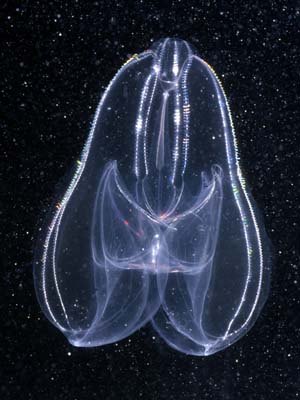
Mnemiopsis
sp.
|
Scientists
are hoping that two alien ctenophore species will battle it out
in the Black Sea and eventually restore its fragile ecological balance.
The latest comb jelly is acting as a form of biological control,
attacking the earlier invader that ran riot when it reached the
sea in the 1980s.
The seeds
of disaster were sown in the 1970s as increasing salinity, pollution
and overfishing began to bite. "The Black Sea ecosystem was
about as screwed up as something could get," says Monty Graham,
a biologist at the Dauphin Island Sea Lab in Alabama. Then the comb
jelly Mnemiopsis leidyi, a relative of jellyfish, arrived
on the scene, probably in the ballast water of a ship traveling
from the East Coast of the United States.This invador, with a plentiful
food supply and a lack of predators, underwent a population explosion.
|
|
Mnemiopsis has
a great appetite for the zooplankton that many fish also eat, as
well as for actual fish eggs and larvae. Its dominance was so rapid
that by 1989 there was about a billion tonnes of it, while the numbers
of fish, including those of the commercially valuable anchovy, had
plummeted. The situation became critical, causing the virtual collapse
of the anchovy, scad and sprat fisheries and an increase in toxic
red algae blooms.
|
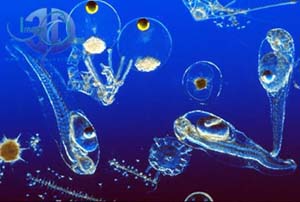
Zooplankton:
Fish eggs & larvae
|
|
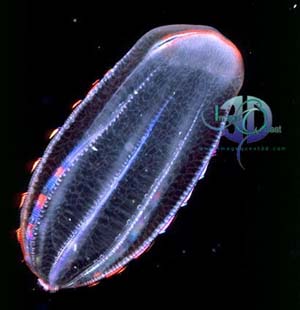
Beroe
ovata
- note flashing comb
-plates
|
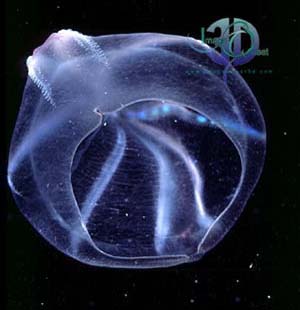
Beroe
ovata
- mouth agape
|
|
Biologists considered
introducing one of Mnemiopsis's predators such as Beroe
ovata, another comb jelly to rebalance the food web. However
the idea seemed too risky because attempts to use biocontrols, such
as the introduction of the cane toad to Australia, can go horribly
wrong. For example Beroe may also begin to eat native comb jellies
or other species that are important to the ecosystem and therefore
cause the original problems to escalate.
Then, without any intervention
by humans, in 1997, B. ovata established itself in the Black
Sea of its own accord, either by migrating naturally from the Mediterranean
or possibly in ship's ballast water again. Initial occupation of
coastal areas spread rapidly and by 1999 Beroe populations
in the entire northeast region of the Black Sea.
"I could not believe
it," says Tamara Shiganova of the Shirshov Institute of Oceanology
in Moscow. Since Beroe arrived there has been a massive decline
in the Mnemiopsis population while some species of plankton
have begun to increase, Shiganova and her colleagues report in a
paper that will appear in Hydrobiologia. Because B. ovata
feeds upon animals similar to itself, such as Mnemiopsis,
as opposed to the smaller zooplankton and fish populations, the
initial reports look positve. However, the
long term effects are much more difficult to predict. It will take
many years of monitoring population cycles, ecosystem dynamics and
seasonal variations in order to determine the true impact that this
invasion will have.
|
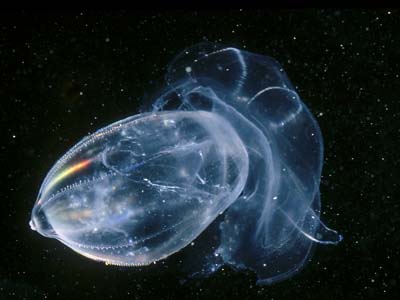
Beroe ovata
(left) devouring Mnemiopsis
|
|
For
more information contact:
Monty Graham,
Senior Scientist, Mississippi-Alabama Sea Grant Research Scientist
Dauphin Island Sea Lab, (O) 334-861-7555, Email:
mgraham@disl.org
Dr. Tamara. Shiganova
, Scientist, Shirshov Institute of Oceanology, Russian Academy of
Sciences, Moscow, +7 (095) 129-23-27,
Email: shoganov@thip.fio.rssi.ru
|
 Recent
dramatic changes in the Black Sea ecosystem: the reason for the
sharp decline in Turkish anchovy fisheries. Recent
dramatic changes in the Black Sea ecosystem: the reason for the
sharp decline in Turkish anchovy fisheries.
|
 Seasonal and
Long-term Modifications on the Temporally-Evolving Black Sea Epipelagic
Ecosystem: A Synthesis of Observations and Model Simulations
Seasonal and
Long-term Modifications on the Temporally-Evolving Black Sea Epipelagic
Ecosystem: A Synthesis of Observations and Model Simulations
|
Click below to view more news articles

|